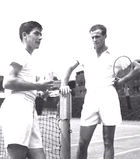Ken McGregor: Difference between revisions
imported>Hayford Peirce (copied all of MY material from the WP article here to get it started -- will finish it shortly, after lunch) |
imported>Hayford Peirce (rewrote the first paragraph) |
||
| Line 1: | Line 1: | ||
[[Image: | [[Image:Ken_McGregor_Circa_1950.jpg|140px|right|thumb|McGregor hitting a smash in the early 1950s]] | ||
''' | '''Kenneth Bruce McGregor''' (June 2, 1929 – December 1, 2007) was an Australian [[tennis]] player who won the Men's Singles of the [[Australian Open]] in 1952. He and his longtime partner, [[Frank Sedgman]], are generally considered to be one of the greatest doubles teams of all time. In 1951 and 1952 they won seven consecutive [[Grand Slam (tennis)|Grand Slam]] doubles titles, a feat that has never been matched. At the end of 1952 [[Jack Kramer]] induced both Sedgman and McGregor to turn professional, where his success was much more limited. In the 1952-1953 tour against [[Pancho Segura]], which served as the warm-up event to the Kramer-Sedgman headline match, McGregor was beaten by the little Ecuadorian-American 71 matches to 25, losing the first 18 matches. The following year, 1953–1954, in a brief tour with [[Pancho Gonzales]], who was the threshold of becoming the greatest player in the world, he was beaten 15 matches to 0.<ref>''The History of Professional Tennis'', Joe McCauley, page 199.</ref> | ||
[[Image: | [[Image:McGregor_and_Rosewall_1952.jpg|140px|left|thumb|Ken McGregor (right) with [[Ken Rosewall]] in 1952]] | ||
McGregor was a fine all-round athlete excelling in [[cricket]], Australian-rules football, and tennis. At 6'3", he had a powerful serve and overhead. [[Ellsworth Vines]], an even great player, said of him: "He was the same height as [[Pancho Gonzales]], faster, moved as well and could jump higher, and once he got to the net he was difficult to pass because of his prehensile reach. The handsome Aussie had the most extraordinary overhead of all time." In his 1979 autobiography Jack Kramer, the long-time tennis promoter and great player himself, who brought McGregor into professional tennis, wrote that "McGregor was one of the weakest players but one of the nicest guys who ever played for me in the pros. As nearly as I could tell, all he wanted to do was save up some money, go back Down Under and play Australian-rules football, which in fact, he played better than he did tennis. And that's what he did." | McGregor was a fine all-round athlete excelling in [[cricket]], Australian-rules football, and tennis. At 6'3", he had a powerful serve and overhead. [[Ellsworth Vines]], an even great player, said of him: "He was the same height as [[Pancho Gonzales]], faster, moved as well and could jump higher, and once he got to the net he was difficult to pass because of his prehensile reach. The handsome Aussie had the most extraordinary overhead of all time." In his 1979 autobiography Jack Kramer, the long-time tennis promoter and great player himself, who brought McGregor into professional tennis, wrote that "McGregor was one of the weakest players but one of the nicest guys who ever played for me in the pros. As nearly as I could tell, all he wanted to do was save up some money, go back Down Under and play Australian-rules football, which in fact, he played better than he did tennis. And that's what he did." | ||
McGregor was inducted into the [[International Tennis Hall of Fame]] in [[Newport, Rhode Island]], in [[1999]]. | McGregor was inducted into the [[International Tennis Hall of Fame]] in [[Newport, Rhode Island]], in [[1999]]. | ||
Revision as of 14:26, 8 June 2011
Kenneth Bruce McGregor (June 2, 1929 – December 1, 2007) was an Australian tennis player who won the Men's Singles of the Australian Open in 1952. He and his longtime partner, Frank Sedgman, are generally considered to be one of the greatest doubles teams of all time. In 1951 and 1952 they won seven consecutive Grand Slam doubles titles, a feat that has never been matched. At the end of 1952 Jack Kramer induced both Sedgman and McGregor to turn professional, where his success was much more limited. In the 1952-1953 tour against Pancho Segura, which served as the warm-up event to the Kramer-Sedgman headline match, McGregor was beaten by the little Ecuadorian-American 71 matches to 25, losing the first 18 matches. The following year, 1953–1954, in a brief tour with Pancho Gonzales, who was the threshold of becoming the greatest player in the world, he was beaten 15 matches to 0.[1]

McGregor was a fine all-round athlete excelling in cricket, Australian-rules football, and tennis. At 6'3", he had a powerful serve and overhead. Ellsworth Vines, an even great player, said of him: "He was the same height as Pancho Gonzales, faster, moved as well and could jump higher, and once he got to the net he was difficult to pass because of his prehensile reach. The handsome Aussie had the most extraordinary overhead of all time." In his 1979 autobiography Jack Kramer, the long-time tennis promoter and great player himself, who brought McGregor into professional tennis, wrote that "McGregor was one of the weakest players but one of the nicest guys who ever played for me in the pros. As nearly as I could tell, all he wanted to do was save up some money, go back Down Under and play Australian-rules football, which in fact, he played better than he did tennis. And that's what he did."
McGregor was inducted into the International Tennis Hall of Fame in Newport, Rhode Island, in 1999.
Notes
- ↑ The History of Professional Tennis, Joe McCauley, page 199.
Sources
- The Game, My 40 Years in Tennis (1979), Jack Kramer with Frank Deford (ISBN 0-399-12336-9)
- The History of Professional Tennis (2003) Joe McCauley
